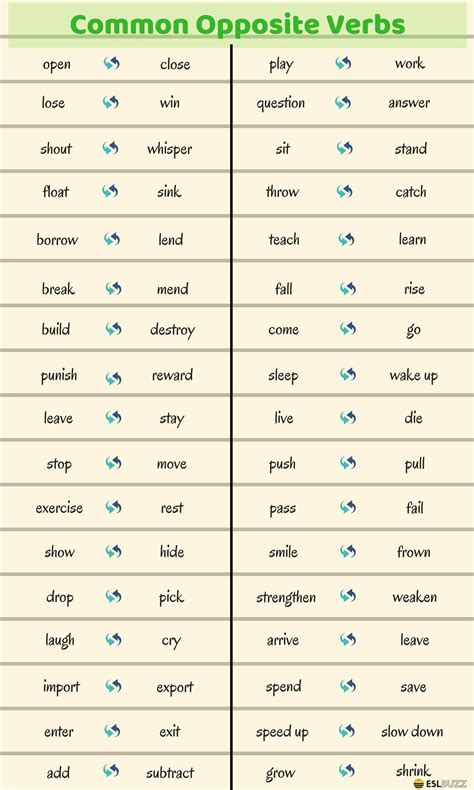In the world of language, opposites play a crucial role in helping us convey our thoughts and ideas with precision. Verb opposites, in particular, are a fascinating area of study that can enhance our understanding of the intricacies of language. In this article, we will delve into the realm of verb opposites and explore seven pairs that demonstrate the contrast between different actions or states.
Opposites in Language
Opposites are words that convey contrasting meanings. They are an essential part of language, enabling us to express ourselves with clarity and precision. In the case of verbs, opposites help us describe different actions or states, highlighting the contrasts between them.
7 Pairs of Verb Opposites
Here are seven pairs of verb opposites, each illustrating a distinct contrast:
1. **Buy** vs. **Sell**

To buy means to acquire something in exchange for money or another form of compensation. On the other hand, to sell means to give something to someone in exchange for money or another form of compensation. These two verbs are direct opposites, highlighting the contrasting actions of acquiring and giving.
Example Sentences:
- I will buy a new phone tomorrow. (Acquiring)
- She sold her old car to a neighbor. (Giving)
2. **Lend** vs. **Borrow**

To lend means to give something to someone for a short period, expecting it to be returned. To borrow, on the other hand, means to take something from someone for a short period, intending to return it. These two verbs demonstrate the contrast between giving and taking.
Example Sentences:
- Can you lend me your book for a week? (Giving)
- I need to borrow some money from my parents to pay the rent. (Taking)
3. **Grow** vs. **Shrink**

To grow means to increase in size, amount, or degree. To shrink, on the other hand, means to decrease in size, amount, or degree. These two verbs illustrate the contrast between expansion and contraction.
Example Sentences:
- The company's profits will grow next year. (Increase)
- The shirt shrunk in the wash. (Decrease)
4. **Create** vs. **Destroy**

To create means to bring something into existence or produce something new. To destroy, on the other hand, means to cause something to cease to exist or be severely damaged. These two verbs demonstrate the contrast between construction and destruction.
Example Sentences:
- The artist created a beautiful painting. (Bring into existence)
- The hurricane destroyed the coastal town. (Cause to cease to exist)
5. **Start** vs. **Stop**

To start means to begin or initiate something. To stop, on the other hand, means to cease or bring something to an end. These two verbs illustrate the contrast between beginning and ending.
Example Sentences:
- I will start my new job next week. (Begin)
- Please stop the music; it's too loud. (Cease)
6. **Build** vs. **Demolish**

To build means to construct or assemble something. To demolish, on the other hand, means to tear down or destroy something. These two verbs demonstrate the contrast between construction and destruction.
Example Sentences:
- The company will build a new skyscraper in the city. (Construct)
- The old building will be demolished next month. (Tear down)
7. **Increase** vs. **Decrease**

To increase means to become or make something greater in amount, degree, or intensity. To decrease, on the other hand, means to become or make something smaller in amount, degree, or intensity. These two verbs illustrate the contrast between growth and reduction.
Example Sentences:
- The company's profits will increase next year. (Become greater)
- The population of the city will decrease due to migration. (Become smaller)






Conclusion
In conclusion, verb opposites play a vital role in the English language, enabling us to express ourselves with precision and clarity. The seven pairs of verb opposites discussed in this article demonstrate the contrasts between different actions or states, highlighting the importance of understanding these opposing verbs. By mastering verb opposites, we can enhance our language skills and communicate more effectively.
What are verb opposites?
+Verb opposites are pairs of verbs that convey contrasting meanings, enabling us to express ourselves with precision and clarity.
Why are verb opposites important?
+Verb opposites are essential in the English language, as they help us communicate more effectively and convey our thoughts with clarity.
How can I master verb opposites?
+To master verb opposites, practice using them in context, and try to identify the contrasting meanings between each pair of verbs.
